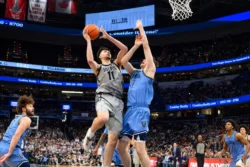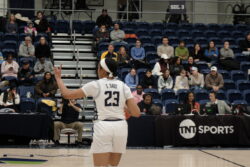Sept. 11 did not come to my mind on Monday, at least not initially. Instead, my mind wandered to 10 days after that fateful day in 2001, to September 21. That day, Mike Piazza and the Mets resurrected New York City’s vibrancy from the horrors of the attack on the World Trade Center. For about three hours, people around the city and the nation were afforded an escape from it all. Piazza’s game-winning homerun that day simply topped an incredibly unifying day.
I was 10 years old. I lived 20 minutes away and continually marveled at the World Trade Center whenever we so much as approached the George Washington Bridge. All of a sudden, it was gone—but my Mets were still there, providing solace to everyone in mourning, even if it was just for nine innings.
And so, when the bombs struck in Boston, marring one of the greatest traditions in sports—the Boston Marathon—I took my time to reflect on the immediacy of the attacks and the death and injury toll.
But then I thought back to 2001 and the simplistic comfort I drew from that small window of distraction. In that sense, on Monday, those two worlds collided. What once provided almost 40,000 people in Shea Stadium a temporary reprieve—a sporting event—was now the target of someone else’s vitriol.
The Boston Marathon represents everything that is right about sports. It brings people together, shuts down an entire city, and affords thousands of participants who have been training for months, years, or their whole lives a venue to achieve greatness.
Aside from all that, marathon runners are the opposite of the spoiled athletes we glorify on television. It is something I only realized a few weeks ago, when I had to make a list of 50 life goals for my entrepreneurship class. Creating the list itself was a rewarding experience, especially because I conjured all kinds of aspirations. I happened to throw in “finish one marathon in each of the next three decades” near the end of the list without giving it much of a second thought.
Monday forced my hand. There is something special about a marathon runner, someone willing to endure the rigors of training tirelessly for a grueling, 26-mile run. I struggle enough to recover from a bit of soreness after my slow-and-steady runs that typically equal a quarter of that distance. But if they want to succeed, they go at it again, and again, and again.
Running is sport in its simplest sense. It brings together every class, race, creed, with no regard. It’s not an expensive endeavor where an athlete needs to go out and buy a pair of Air Jordans and a basketball or a leather glove and a bat.
In and of itself, that is part of why this attack hurts so much. The bombs devastated an international sporting event. The marathon is not just for Bostonians or even Americans. An Ethiopian or Kenyan man has won the race 24 of the past 25 years. Even handicapped participants in wheelchairs go through the course.
By attacking the Boston Marathon, the very fiber of an open, tolerant society that is capable of accepting greatness from anywhere—be it a poor African country or a native Bostonian—was threatened.
Still, I hesitate to say the attack cements the Boston Marathon as an even more important race now, as a place where people triumphed over adversity and the world came together. Frankly, that acknowledges the attackers in a light that I am not too comfortable with.
Regardless, next year’s race takes on a new level of publicity. This year’s winners do not matter more than any other year, nor will next year’s matter all that much. That is the underlying point of sorts, as the winner is crowded out by the eclectic group of athletes that are able to cross that finish line.
That joy does not have to come from a sporting event. Patriot Monday would roll on just fine in Boston without the marathon by its side. It just makes it all the more special. In the same manner, New Yorkers did not need the Mets to pick themselves up after September 11.
But it helped. All of America was tuned in on that day, just as they will be on Patriot Monday one year from now for the marathon. On a national level, perhaps a heightened interest level is a bit contrived. It’s not my team, it’s not my city. But that doesn’t matter all that much in the face of national tragedy like this—I know come next year, I’ll be watching.





